Related Research Articles

Joseph Zen Ze-kiun, SDB is a retired Chinese cardinal of the Catholic Church who served as Bishop of Hong Kong from 2002 to 2009. He was made a cardinal by Pope Benedict XVI in 2006 and has been outspoken on issues regarding human rights, political freedom, and religious liberty.

The Cathedral of Saint Ignatius of Loyola, also known as the Xujiahui Cathedral or sometimes known as the Xujiahui Catholic Church, is the Catholic cathedral of the Latin Church diocese of Shanghai, located in Xujiahui, Shanghai, China.

Ignatius Kung Pin-Mei was the Catholic Bishop of Shanghai, China, from 1950 until his death in 2000. He spent 30 years in Chinese prisons for defying attempts by China's Communist government to control Catholics in the country through the government-approved Catholic Patriotic Association. At the time of his death he was the oldest member of the College of Cardinals.
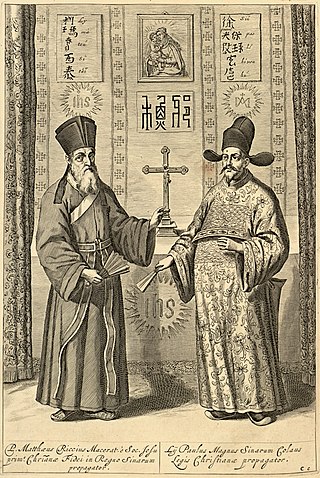
The Catholic Church first appeared in China upon the arrival of John of Montecorvino in China proper during the Yuan dynasty; he was the first Catholic missionary in the country, and would become the first bishop of Khanbaliq (1271–1368).

John Baptist Wu Cheng-chung was the fifth Roman Catholic bishop of Hong Kong and the first cardinal from that diocese. He was a member of the Congregation for the Evangelization of Peoples, the Pontifical Council for Social Communications and the Congregation for Divine Worship and the Discipline of the Sacraments.
The term underground church is used to refer to Chinese Catholic churches in the People's Republic of China which have chosen not to associate with the state-sanctioned Catholic Patriotic Association; they are also called loyal church. "Underground" does not mean the underground church is secret but refers to its lack of official approval and lack of official support. Underground churches came into existence in the 1950s, after the Communist Party's proclamation of the People's Republic of China, due to the severing of ties between Chinese Catholics and the Holy See.
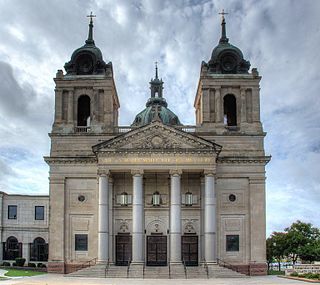
The Diocese of Wichita is a Latin Catholic ecclesiastical territory, or diocese, of the Catholic Church in Kansas in the United States. It is a suffragan diocese in the ecclesiastical province of the metropolitan Archdiocese of Kansas City in Kansas.

The Diocese of Shanghai is a diocese of the Catholic Latin Church in the municipality of Shanghai, China. It was erected on December 13, 1933 as the Apostolic Vicariate of Shanghai by Pope Pius XI and was later elevated to the rank of a diocese on April 11, 1946, by Pope Pius XII. The diocese is a suffragan diocese of the Archdiocese of Nanking.
John Han Dingxiang was an underground Roman Catholic bishop of Yongnian, a division of Hebei province, in China. Han was detained for much of his ministry for his loyalty to the Vatican as opposed to the Chinese government-controlled Roman Catholic Church.

John Tong Hon is a prelate of the Catholic Church from Hong Kong. A cardinal since 2012, he was auxiliary bishop of Hong Kong from 1996 to 2008, then coadjutor bishop of the diocese for a year, and Bishop of Hong Kong from 2009 to 2017. In January 2019, he became the apostolic administrator of the diocese, in a caretaker role, after the death of his successor, Michael Yeung.
Significant doctrinal and diplomatic developments involving the Holy See and Chinese Catholics occurred during the Papacy of Pius XII (1939-1958). The Vatican recognized Chinese rites in 1939, elevated the first Chinese cardinal in 1946, and established a Chinese hierarchy.
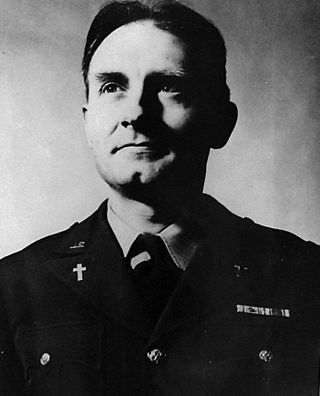
Emil Joseph Kapaun was a Catholic priest and United States Army captain who served as a United States Army chaplain during World War II and the Korean War. Kapaun was a chaplain in the Burma Theater of World War II, then served again as a chaplain with the U.S. Army in Korea, where he was captured. He died in a prisoner of war camp.
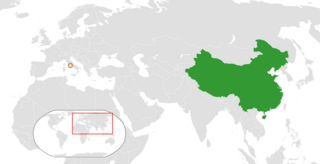
There are no official bilateral relations between the People's Republic of China (PRC) and the Holy See. The Holy See instead recognizes the Republic of China (Taiwan) as the representative of China ever since the establishment of relations with the ROC government in 1942.
Julius Jia Zhiguo is an underground bishop of the Roman Catholic Church in the People's Republic of China.
Bishop Peter Joseph Fan Xueyan was a Chinese Roman Catholic priest and bishop who lived in China during the 20th century. He was bishop of the Roman Catholic diocese of Baoding.
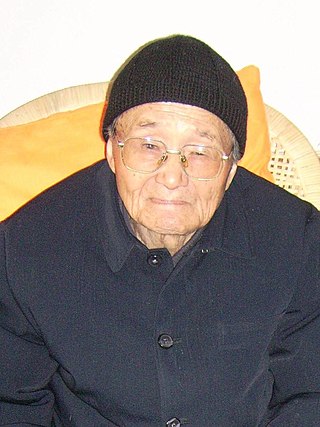
Joseph Fan Zhongliang S.J., also known as Josephus Vei Zong Leong, was a Chinese Roman Catholic bishop in the Diocese of Shanghai in China.

Luis Antonio Chito Gokim Tagle is a Filipino prelate of the Catholic Church currently serving as the Pro-Prefect for the Section of Evangelization of Dicastery for Evangelization since June 5, 2022, and as the President of Interdicasterial Commission for Consecrated Religious since December 8, 2019. He was the 32nd Archbishop of Manila from 2011 to 2020. Tagle is the Cardinal-Bishop of San Felice da Cantalice a Centocelle and also serves as the President of the Catholic Biblical Federation, Grand Chancellor of the Pontifical Urbaniana University, and as a member of various departments and dicasteries in the Roman Curia.
Political theology in China refers to the religious beliefs and principles that motivate the politics of China. For two millennia, China was organized on a Confucian understanding of religion and politics, often discussed in terms of Confucian political philosophy. At various points throughout its history, Chinese Buddhism presented an alternative to the political import of Confucianism. However, since the mid-twentieth century, communist understandings of religion have dominated the discourse.

Anthony Eugene Clark is an American Sinologist, historian, and writer who has authored dozens of books, articles, and other publications in the fields of Sino-Western, Sino-Missionary, and ancient Chinese history. He is the Edward B. Lindaman Endowed Chair and a professor of Chinese history at Whitworth University. He previously taught courses on Chinese history, culture, and literature at the University of Oregon and The University of Alabama. His most widely read books are China's Saints: Catholic Martyrdom during the Qing, Heaven in Conflict: Franciscans and the Boxer Uprising in Shanxi, and China Gothic: The Bishop of Beijing and His Cathedral, which includes a foreword by the architectural historian, Leland M. Roth. Clark's major interest is late-imperial China, especially the final decades of the Qing dynasty, and the intellectual and religious relations between China and the West. Clark resides with his wife, Amanda, in Spokane, Washington.
References
- ↑ Townsend, Tim. (May 12, 2002) The New York Times Keeping a Finger On China's Pulse. Section: 14CN; Page 3.
- ↑ Olesen, Alexa (2007-09-11). "Bishop who led underground Chinese congregation dies in custody". Boston.com. Retrieved 2007-09-01.[ dead link ]
- 1 2 Associated Press (January 28, 1994) Chinese Bishop Arrested After Meeting Congressman.
- ↑ Calovich, Anne. (January 29, 1994) The Wichita Eagle Bishop arrested in China. Section: Main News; Page 12A.
- Rosenthal, Elisabeth. (October 6, 2002) The New York Times In China, Catholic Churches Flourish, but Under Controls. Section: 1; Page 11.
- Agence France-Presse (January 11, 1997) China in full-scale campaign to wipe out secret Catholics: report BEIJING, Jan 11 (AFP) - China has launched a hard-hitting campaign to wipe out all trace of its unauthorized Catholic church, the US-based Cardinal Kung Foundation said Saturday. Section: International.
- Agence France-Presse (November 7, 1997) Chinese Roman Catholic bishop remains in detention in northern China BEIJING, Nov 7 (AFP) - Roman Catholic bishop Su Zhimin, arrested in China early last month, was being detained in the northern city of Baoding, despite Vatican reports of his release, the US-based Cardinal Kung Foundation said Friday. Section: International.
- Associated Press (March 12, 2000) Cardinal Kung, long imprisoned Catholic crusader in China, dies at 98.